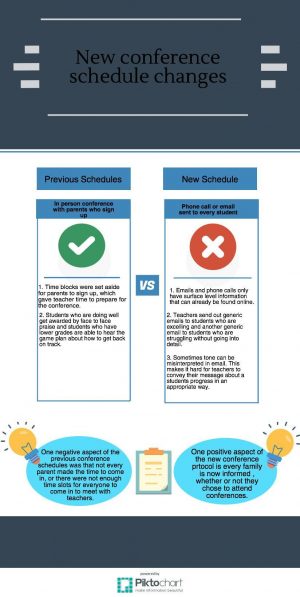New conference schedule puts barrier between community and school
March 26, 2017

Conferences have always been seen as an opportunity for parents to connect with their children’s teachers to hear about the progress they have made during the year. However, this spring the school has decided to change the way conferences are held for 7th through 12th graders and have every student receive a call or email home, which substitutes face-to-face conferences. In-person conferences are an important part of a student’s success and should not be taken out of the school system.
The new conference protocol requires teachers to send out an email or a phone call to parents of every student. Last year and in previous years, teachers set aside two four-hour time blocks for parents to sign up for a conference. There also have been arena style conferences in the past, where parents wait in line for a conference in an auditorium where they talk to teachers posted at tables.
Language Arts teacher Lori Stippel said, “I personally prefer the conferences that parents sign up for. I take a lot of time, as other teachers do, by looking at student’s past test scores, their pattern of behavior in my class and what they need to do to move forward. To be honest with you, doing it this way, I can build a partnership with these parents.”
Teacher to parent communication is almost as important as teacher to student. Building a mutual understanding between a parent and student as to what needs to be done to succeed will yield better results than if a student has to push through high school alone. It is important for teachers like Stippel to have time to prepare for conferences and meet with parents face to face, so they can have in depth conversations.
Emails and phone calls only can go so far and only contain information that is already accessible online. Skyward.com provides information on grades to every student so parents who are interested in knowing their children’s grades are already aware. Sending an email to parents who already do not check their child’s grades will not change their outlook without having those detailed conversations with parents.
I personally prefer the conferences that parents sign up for. I take a lot of time, as other teachers do, by looking at student’s past test scores, their pattern of behavior in my class and what they need to do to move forward. To be honest with you, doing it this way, I can build a partnership with these parents.
— Lori Stippel
Stippel added, “In an email, there is no conversation. A conversation that could have been had face to face or on the phone taking 10 to 15 minutes could go on for days or not at all.”
The depth of conversation is definitely compromised or never even happens with this new conference format. The likelihood of parents having the time to meet with teachers and learn things under the surface level, such as how well their child participates in the class, where they need to improve and even who they hang out with in class, is very slim. It is significantly harder for parents to do this when there is not a specific night to plan this with all the teachers. It is an option to meet with teachers still, but they will more than likely be on different days because the teachers choose the time periods, in shorter increments, to when they are available. Most parents will not have the time in their schedule to come to the school on five or six separate occasions (one time for every class their child is taking).
Math teacher Pam Bloom explained, “When I email the parents, I worry about what tone I am coming off as in an email because you don’t know if they are understanding what you are saying and you don’t know if they are asking what you think they are asking. Emails are harder to interpret. Hopefully, if they don’t feel good about it, they can come talk to me, but not every parent feels comfortable doing that.”
Any conversation of importance should not be had without face-to-face contact because people are unable to factor in personality, tone and they cannot see facial expression. If a parent misinterprets something that is said in a negative way, it is less likely they are going to feel comfortable asking to meet. It can create unwanted tension and confusion between the parent and teacher and take away from the original focus, the student’s progress.
“There isn’t a lot of positives for being an exceptionally good student and being a good kid who puts their nose to the grindstone. There aren’t a lot of big perks. Nobody has a pepfest for them… This is the one time that parents of the exceptional students get to come through and feel the pride face-to-face. We need these kinds of people if we want to evolve in a positive fashion,” Stippel added.
Students who are doing well in classes are not given much praise for their work. High school is not a walk in the park and taking advanced classes or achieving high grades needs to be recognized. These over achievers are the future doctors and lawyers of our generation. They need to be reminded that what they are doing is noticed so that they feel like their hard work is paying off.
Parents like to hear about their student’s success, as conferences were meant for both struggling students and students who are excelling. Now parents whose students are exceeding expectations, do not really have a chance to come in and hear all the wonderful things that their child is doing.
Stipple said, “With this format, we have essentially said, ‘don’t come into the building. Don’t call us, we’ll call you.’ I feel we are alienating the very people we should embrace more than anything.”
In a letter to families, principal Robert Bach said, “For the past several years, our secondary schools have held both fall and winter conferences. The traditional format of five-minute conferences has been less than desirable for many families. In response to your feedback, we will be trying a new format to share student progress information with families this winter.”
Bach believes that based on parent feedback most parents do not believe that five-minute conferences are helpful. On the other hand, taking away these conferences is minimizing the time teachers and parents are communicating even more so. Although an email is being sent out to every student, there is now an added barrier between the school and the community. Parents who want to be involved are not going to be as strongly informed as they have previously have been. The parents who took responsibility are being punished for the parents who have not.
The original conference platform should be used so that parents can know what is happening with their child’s education. It is not only the teacher’s liability to allow for in-person conferences, but it is also the parent’s duty to take action and actively participate in their child’s education.

Cates Eliasen • Apr 30, 2017 at 8:52 pm
I really agree with your article and you supported your view very nicely. Your points about how difficult it is now for parents to get in-depth communication with teachers and how chaotic and unorganized the new format is are very valid and well thought-out reasons to return to a more traditional conference schedule. It was also nice to hear from an SAHS teacher on the conferences, as well, to see their takes on it. Great article and commendable arguments!